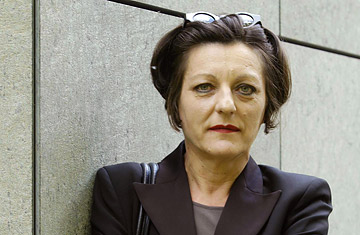
Author Herta Müller, winner of the 2009 Nobel Prize for Literature
The Romanian-born German poet and novelist Herta Müller is the winner of the 2009 Nobel Prize for Literature, the Swedish Academy announced today. The academy describes Müller as a writer "who, with the concentration of poetry and the frankness of prose, depicts the landscape of the dispossessed." She is the 12th woman to win the prize in its 109-year history.
The author said she was speechless when she heard the news. "I am so surprised and I still can't believe it," she said in a statement released by her publisher.
She is a surprising choice to Americans too — only a few of Müller's books have been translated into English — but in a way it would have been a surprise if the choice had not been a surprise. In the past decade, about half of the Nobel laureates in literature have been writers of whom few readers in the U.S., academics and literary journalists included, had or have any real awareness. What Americans may not realize is that Müller's selection isn't much less surprising in Germany. Müller, whose major works include The Land of Green Plums and The Appointment, is one of Germany's most decorated writers — her book Atemschaukel has been shortlisted for this year's German Book Award, which will be announced at next week's international book fair in Frankfurt — and critics there hold her in high esteem, but almost no one considered her a figure of global literary eminence.
"Twenty years after the end of the East-West conflict, Herta Müller has been rewarded for keeping alive memories of the inhumane side of state communism," said Michael Krüger, of the publishing house Carl Hanser, based in Munich. "She is an impressive example of a European committed literature that succeeds in bringing history into the present-day with analytical sharpness and poetic exactness."Müller was born in 1953 in the village of Nitzkydorf, Romania. Europe's agonizing political history was already in her DNA: her father had served in the Waffen SS, the crack combat troops of the Nazi Party, and after the war her mother spent five years in a Soviet work camp. Müller was a member of Romania's German-speaking minority — almost no one in Nitzkydorf spoke anything else. This paradoxical sense that even in her homeland, she was in exile, would have a profound effect on her work.
At university Müller agitated for freedom of speech, a right increasingly difficult to come by under Nicolae Ceauşescu's dictatorship, especially for German-speaking Romanians. After graduation she became a translator at a factory, but she ran afoul of the secret police when she refused to serve as an informant and lost her job. She began writing fiction, and in 1982 she published a collection of stories called Niederungen, rendered in English as Nadirs. In spare, poetic, forceful language the stories describe cruelty and repression in a German-speaking village much like the one Müller grew up in.
The publication of Niederungen was much delayed, and when it finally appeared it was censored extensively, and Romanian critics dismissed it. But Müller managed to smuggle an uncensored copy to Germany, where the stories received rapturous praise. Müller moved to Germany in 1987 and has lived in Berlin with her husband ever since — like her mother before her, a political exile.
Since then Müller has published more than 20 books, both fiction and poetry. She revisits persistently, almost obsessively, her earlier life in Romania and her experience of political oppression. The Land of Green Plums describes the fate of a young woman from the country who attends a Romanian university. Over the course of the novel — it's narrated by one of her roommates — Lola is politically harassed and sexually traumatized, and finally she hangs herself. The title refers to the unripe plums that the city's ogreish police officers steal and eat as they roam the streets, in a display of brainless gluttony.
It is not just the experience of tyranny but in particular the woman's experience of tyranny that interests Müller. At the beginning of The Appointment a young Romanian woman who works in a factory is arrested by the secret police. The factory makes suits for export to Italy, and she has been caught slipping notes into the linings that say "Marry me," with her name and address.
Reviews of Müller's fiction in America have been largely positive, though there has been some reluctance to embrace her almost relentlessly bleak totalitarian cityscapes. Müller herself has dismissed suggestions that she focuses too narrowly on a single subject. "The most overwhelming experience for me was living under the dictatorial regime in Romania," Müller has told the press. "And simply living in Germany, hundreds of kilometers away, does not erase my past experience. I packed up my past when I left, and remember that dictatorships are still a current topic in Germany."
If the past is any guide, the Nobel won't make Müller a household name in America — it certainly hasn't done much for Elfriede Jelinek (who won in 2004) or Jean-Marie Gustave Le Clézio (2008). That may simply be because there is little in the lives of most Americans that resonates with what Müller has gone through. Then again, for Müller, life under tyranny seems to be in part a figure for the existential terror of life anywhere. It is a world of secrecy and universal suspicion. Everyone suspects everyone of betrayal, both political and sexual — the line between the two is never clear. No one is incorruptible. As the narrator of The Appointment puts it: "The trick is not to go mad."
